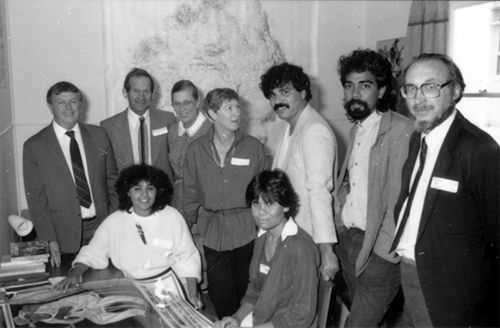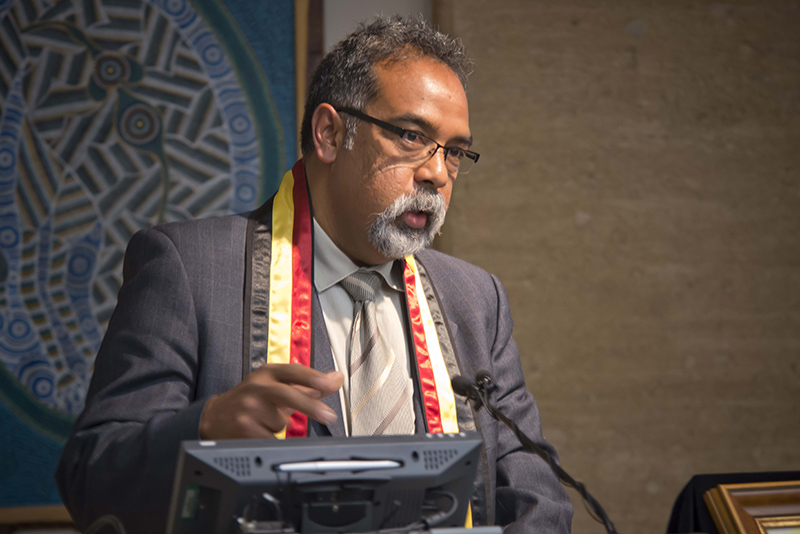2022 UNE Distinguished Alumni Award winner - Mr Romlie Mokak
In recognition of his significant contribution to improving the health of Aboriginal and Torres Strait Islander people and his systematic reform of medical education in Australia to increase the number of Indigenous medical graduates.
The Aboriginal children spared a premature death, brain injury or permanent disability from petrol sniffing in the early 2000s would be adults now, with children of their own. It’s a profound thought for policy-maker, advocate and Djugun man Romlie Mokak (or Rom), who was central to developing the national strategy to combat the deadly problem.
Not that you will hear Rom, a 2022 UNE Distinguished Award winner, claiming credit. Although his role in brokering a solution in collaboration with Aboriginal communities, governments and the fuel industry is well documented, this humble leader is more inclined to reflect on the partnerships behind the successful transition to low-aromatic fuel.
“We had a whole lot of kids being robbed of their existence and futures through access to sniffable fuels,” Rom recalls, noting the negative impact of petrol sniffing within some remote communities. “I was a fairly lowly bureaucrat making these representations. The work I did relied on a whole range of people and bodies to deliver.”
The impact of introducing the world’s first low-aromatic fuel (called Opal), along with wider supports and services, was dramatic.
“The number of sniffers decreased overnight and that has been sustained for 20 years,” says Rom. “It was an example of Aboriginal leadership converging with public policy, for the good of the kids, their families and the country. People still talk about the significance of it today, but I will always herald the strength of Aboriginal communities in that work.”
His humility notwithstanding, the petrol-sniffing program exemplifies the collaboration, cultural centredness and determination that Rom has demonstrated throughout a career that has seen him work at community, state and national levels in Aboriginal and Torres Strait Islander policy spanning disability, medicine and health, ageing and finance.
 Official opening ceremony of "OORALA". Left to right standing: Professor L.McNichol (Vice-Chancellor), Dr R.Robertson-Cuninghame (Chancellor), Mrs R Robertson-Cuninghame, Ms Jan McIntyre, Mr Warren Mundine, Mr Romlie Mokak, Professor John Nalson (Pro Vice-Chancellor). Seated: Ms Cheryl Kitchener, Sharon Moore.
Official opening ceremony of "OORALA". Left to right standing: Professor L.McNichol (Vice-Chancellor), Dr R.Robertson-Cuninghame (Chancellor), Mrs R Robertson-Cuninghame, Ms Jan McIntyre, Mr Warren Mundine, Mr Romlie Mokak, Professor John Nalson (Pro Vice-Chancellor). Seated: Ms Cheryl Kitchener, Sharon Moore.
Since graduating with a Bachelor of Social Science from UNE in 1988, Rom has served as a long-standing CEO of the Australian Indigenous Doctors Association (AIDA) and as CEO of the national institute for Aboriginal and Torres Strait Islander health research, the Lowitja Institute, among many other roles. He is a past chair of the National Health Leadership Forum, and also a foundation member of the enduring Close the Gap Campaign.
In every role, Rom says his focus has been to secure ethical and equitable treatment for First Nations peoples. This can only be achieved, he says, if Indigenous organisations are actively engaged in policy-making and service delivery that is built upon respecting their knowledge systems.
“More of the same is not going to deliver for us; in fact, we’ll go backwards,” Rom says. “The future of my people is a future that we design and lead. Others – governments, universities, public policy-makers, corporates, not-for-profits – really need to get on board and partner with us. Our communities, our mob, have the solutions but there is often resistance to that. We, Australian people, have to be honest about our history, and right the wrongs of the past.
“Without our culture, we have no future; it’s as simple as that.
“Without our culture, we have no future; it’s as simple as that. It’s a constant battle for recognition of culture as something that empowers and protects our people and serves as a buffer against the racism that is inevitable. The strength of our ancestors assists us to navigate the world, with all its complexities.”
Rom invites any non-Indigenous people he works with to seek out “that intersectional space, where Indigenous and western knowledges can come together and create something that is much more powerful”. It requires humility by all parties “to stay in hard conversations” so that greater understanding, real action and lasting outcomes can result.
As part of his focus on thinking “beyond the horizon, inter-generationally,” Rom invests heavily in the next generation of leaders. “I spend a lot of time supporting and mentoring my people who are now in roles as CEOs and senior public servants. Having black leadership to support future black leadership is critical.”
Professor Peter O’Mara, Director of the Thurru Indigenous Health Unit and Assistant Dean Indigenous Health School of Medicine and Public Health at the University of Newcastle says Rom has been instrumental in reforming medical education to ensure a significant representation of Aboriginal and Torres Strait Islander people in the health workforce. When Rom started at AIDA, the number of Indigenous medical graduates was just 90. Today, graduates number 600, with another 400 students in the pipeline.
“Rom … has inspired Indigenous and non-Indigenous Australians,” Professor O’Mara says. “Throughout his career, he has remained true to his Indigenous culture and has grounded his work in Aboriginal cultural values, while successfully bringing western and Indigenous world views together.”
While rates for Indigenous adult incarceration and young people in out-of-home care are “moving in the wrong direction”, Rom says he is buoyed by increasing numbers of non-Indigenous people who now want to understand our nation’s true history and contribute to Close the Gap initiatives. The growing cohort of Aboriginal and Torres Strait Islander parliamentarians and academic leaders is also cause for optimism. But something more is needed.
“I urge non-Indigenous people who have heard and understood our stories to consider what actions they will take”
“I urge non-Indigenous people who have heard and understood our stories to consider what actions they will take,” Rom says. “This is not about cultural tourism and a feel-good interaction, non-Indigenous people also have to drive an action agenda and to introduce the necessary institutional arrangements and policy settings.”
Since being appointed the first full-time Indigenous Policy Evaluation Commissioner of the Productivity Commission (in 2018), Rom has been travelling Australia engaging with Aboriginal and Torres Strait Islander people and communities as part of a review of policies and programs aimed at improving their lives. He believes all Australians should be demanding greater accountability.
“It’s time for all citizens to get on board, identify what our responsibilities and contributions can be, and to cook up some stuff to truly drive change,” Rom says. “I am not interested in lip service. Our people have died as a result of lip service. I am looking for a demonstration of action, beyond intent, for the benefit of my people.”


